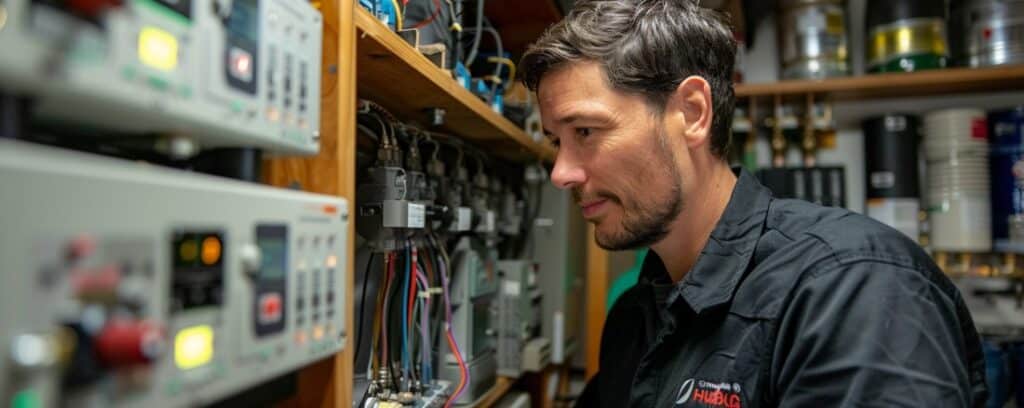- What Does an HVAC Project Manager Do?
- Educational Requirements for HVAC Project Managers
- HVAC Project Manager Role
- Typical Professional Trajectory for HVAC Project Managers
- Job Roles Available to HVAC Project Managers
- Job Outlook and Salary for HVAC Project Managers
- Tips for Finding an HVAC Training Program
As the HVAC industry continues to grow and evolve, so does the demand for skilled professionals who can manage complex projects involving heating, ventilation, and air conditioning systems. Becoming an HVAC project manager is an excellent career path for those with technical expertise, leadership skills, and a desire to oversee the installation, maintenance, and improvement of HVAC systems. This position offers opportunities for career advancement, professional growth, and financial rewards.
What Does an HVAC Project Manager Do?
An HVAC project manager plays a crucial role in overseeing the planning, execution, and completion of heating, ventilation, and air conditioning projects. This role involves a blend of technical knowledge, project management skills, and leadership abilities to ensure that HVAC systems are installed or maintained correctly, efficiently, and within budget.
Key Responsibilities of an HVAC Project Manager:
- Project Planning and Scheduling: HVAC project managers develop timelines and plans for the installation or repair of HVAC systems, ensuring resources are allocated properly to meet deadlines.
- Coordination and Supervision: They coordinate between contractors, engineers, clients, and HVAC technicians to ensure smooth project execution. This includes overseeing site operations and ensuring compliance with safety regulations.
- Budget Management: HVAC project managers are responsible for creating and managing the project budget, tracking expenses, and ensuring that the project stays within financial limits.
- Problem Solving: They must address any issues that arise during a project, such as delays, technical challenges, or supply chain problems, to keep the project on track.
- Quality Control and Compliance: Ensuring that the HVAC system meets all technical specifications, quality standards, and industry regulations is an essential part of the job.
Given the increasing complexity of HVAC systems and the push for energy-efficient solutions, HVAC project managers often work on projects that incorporate the latest technologies, sustainable practices, and smart system integration.
Educational Requirements for HVAC Project Managers
Becoming an HVAC project manager requires a combination of education and practical experience. Most HVAC project managers begin their careers as HVAC technicians, gaining valuable hands-on experience before moving into management roles. To advance into project management, formal education and certifications are often essential.
Education Pathways:
- Associate or Bachelor’s Degree in HVAC, Construction Management, or Engineering: Many HVAC project managers start with degrees in HVAC technology or related fields. Bachelor’s degrees in construction management or engineering may also be beneficial, as they provide a strong foundation in project planning, systems design, and leadership skills.
- Certifications: Industry certifications like HVAC Excellence, North American Technician Excellence (NATE), or Project Management Professional (PMP) are valuable for aspiring HVAC project managers. These certifications demonstrate expertise and leadership capabilities.
- On-the-Job Experience: Practical, hands-on training through apprenticeships or technician roles is crucial. Many HVAC project managers work in the field for several years before taking on supervisory roles. Gaining experience with system installation, maintenance, and troubleshooting is key to understanding the technical aspects of HVAC project management.
This combination of education, certifications, and field experience provides HVAC project managers with the skills they need to oversee complex projects and lead teams effectively.
HVAC Project Manager Role
An HVAC project manager is responsible for overseeing the installation, maintenance, and repair of HVAC systems in both residential and commercial settings. Their primary function is to ensure that projects are completed on time, within budget, and in accordance with safety standards and client requirements.
Key Responsibilities:
- Project Planning and Coordination: HVAC project managers develop and oversee project schedules, allocate resources, and ensure all tasks are completed on time. They work closely with clients, contractors, and technicians to ensure project goals are met.
- Budget Management: HVAC project managers are tasked with controlling costs, preparing budgets, and managing expenditures to ensure projects stay within financial limits.
- Team Leadership: Leading teams of HVAC technicians, project managers provide guidance, assign tasks, and ensure that all work is performed to industry standards.
- Compliance and Safety: Ensuring compliance with local, state, and federal regulations is a crucial part of the HVAC project manager’s role. They ensure all installations and repairs adhere to safety standards, including environmental and building codes.
Overall, HVAC project managers play a pivotal role in ensuring the smooth execution of HVAC projects, from initial planning to project completion. Their leadership, technical knowledge, and communication skills are essential for successful project outcomes.
Typical Professional Trajectory for HVAC Project Managers
The path to becoming an HVAC project manager often involves a combination of technical experience, formal education, and professional development. While the specific route may vary depending on individual career goals, most HVAC project managers follow a trajectory that allows them to develop the necessary skills in both HVAC systems and project management.
Starting as an HVAC Technician
Most HVAC project managers begin their careers as HVAC technicians. This role involves hands-on work with heating, ventilation, and air conditioning systems, including installation, repair, and maintenance. Gaining technical expertise is crucial because HVAC project managers need to understand the systems they oversee.
Key skills developed during this phase:
- Proficiency in HVAC system design and installation
- Ability to troubleshoot and repair complex systems
- Knowledge of local building codes and safety regulations
Transitioning to Lead Technician or Supervisor Roles
After gaining a few years of experience in the field, many HVAC technicians move into supervisory or lead technician roles. In these positions, they begin to oversee small teams of technicians, ensuring that projects are completed efficiently and up to industry standards. This phase helps professionals develop leadership and communication skills, both of which are essential for project management.
Advancing to HVAC Project Manager
Once an individual has established a solid foundation of technical and supervisory experience, they can transition into an HVAC project manager role. At this stage, the professional’s responsibilities expand to include planning and executing projects, managing budgets, coordinating with vendors and clients, and ensuring that work complies with building codes and safety regulations.
Responsibilities of an HVAC project manager include:
- Overseeing HVAC installations and maintenance projects from start to finish
- Creating project timelines and managing budgets
- Communicating with clients, contractors, and team members
- Ensuring compliance with regulations and safety standards
Additional Professional Development
Some HVAC project managers continue to grow their careers by pursuing additional certifications or education in project management. Earning credentials such as the Project Management Professional (PMP) certification or taking advanced courses in construction management can open doors to senior roles, such as general contractor, construction manager, or operations manager.
Job Roles Available to HVAC Project Managers
HVAC project managers have diverse career opportunities due to the demand for their expertise in various sectors. These professionals are responsible for overseeing HVAC system installations, managing projects, and ensuring that everything runs smoothly, from budgeting to compliance with regulations. Below are some of the key job roles available to HVAC project managers:
Construction Companies
Many HVAC project managers find employment with construction companies. These businesses often handle large residential, commercial, or industrial building projects that require the installation of HVAC systems. In this role, the project manager will collaborate with architects, engineers, and contractors to ensure that HVAC systems are installed on schedule and according to the project’s specifications.
HVAC Service and Installation Companies
HVAC service providers also hire project managers to oversee large installation and maintenance projects. These companies may specialize in residential, commercial, or industrial HVAC systems, and the project manager ensures that each project is completed within budget and meets the client’s expectations. This role may involve coordinating between different teams, managing customer relationships, and ensuring compliance with industry standards.
Government Agencies
Government agencies at the local, state, and federal levels also employ HVAC project managers, especially for public works projects such as schools, hospitals, and government buildings. In this role, project managers are responsible for ensuring that HVAC systems are installed and maintained in public buildings. This may involve managing multiple projects simultaneously and ensuring that all installations comply with strict governmental regulations.
Facility Management Companies
Facility management companies often hire HVAC project managers to oversee the maintenance and operation of HVAC systems in large facilities, such as office buildings, hospitals, and universities. These professionals ensure that HVAC systems run efficiently and that regular maintenance is performed to prevent costly breakdowns. Additionally, they may manage the upgrade of outdated systems to more energy-efficient models.
Self-Employment and Consulting
Many experienced HVAC project managers opt to become self-employed or offer consulting services. As independent contractors, they provide expertise to businesses that need project management services on a temporary or project-specific basis. This can be a lucrative option for those with extensive industry knowledge and a strong professional network.
HVAC project managers have a wide range of career opportunities, from working with large construction firms to providing consulting services. Their expertise in managing HVAC projects, coupled with leadership and organizational skills, makes them valuable across various industries.
By pursuing this career, individuals can enjoy flexibility and opportunities for advancement in a growing and essential field.
Job Outlook and Salary for HVAC Project Managers
HVAC project management offers a promising career with strong job prospects and competitive salaries. As the HVAC industry continues to grow, the demand for skilled project managers who can oversee installations, manage teams, and ensure compliance with industry standards remains high. Let’s explore the job outlook and salary expectations for HVAC project managers based on recent data.
Job Outlook for HVAC Project Managers
The U.S. Bureau of Labor Statistics (BLS) provides information on HVAC technicians, but specific data on HVAC project managers can be harder to find. However, HVAC project managers can be categorized under construction managers or general project managers in the industry. Employment for HVAC professionals is expected to grow by 9% between 2023 and 2033, which is much faster than the growth rate for all professions. This steady growth is driven by the increasing need for energy-efficient HVAC systems and regular system upgrades due to new regulations and green building initiatives.
The growth in new construction projects, both residential and commercial, also ensures a continued demand for project managers who specialize in HVAC systems. Technological advances, such as smart HVAC systems, are also contributing to the need for skilled project managers who can oversee these complex installations.
Salary for HVAC Project Managers
HVAC project managers tend to earn competitive salaries due to the technical nature of their work and the responsibility they carry. According to the BLS, the median salary for construction managers , which includes HVAC project managers, was $104,900 per year as of May 2023. HVAC project managers’ salaries can vary depending on the region, the scale of the projects they manage, and their level of experience.
Factors Influencing Salary
Several factors can influence the earning potential of HVAC project managers, including:
- Location: Project managers in metropolitan areas or regions with high construction demand, such as New York, California, and Texas, often command higher salaries.
- Experience: As with most professions, salary increases with experience. Those who have a proven track record of managing complex projects tend to earn more.
- Certification and Education: Project managers with additional certifications or advanced degrees may find themselves eligible for higher-paying positions. For example, certifications such as the Project Management Professional (PMP) can significantly enhance job prospects and earning potential.
- Industry: Project managers working for large construction firms or government agencies tend to have higher earning potential than those working for smaller businesses.
In conclusion, HVAC project managers have a positive job outlook and the potential for strong salaries. By gaining experience, earning certifications, and staying current with industry trends, professionals in this role can enjoy a long-term, rewarding career.
Tips for Finding an HVAC Training Program
Choosing the right HVAC training program is essential for a successful career in HVAC project management. The path to becoming an HVAC project manager requires not only technical knowledge of HVAC systems but also strong leadership and organizational skills. When selecting a program, it’s important to consider several factors to ensure the program aligns with your career goals and provides the necessary skills for the job. Below are tips to help you find the best HVAC training program for your needs:
Program Availability
Before selecting an HVAC training program, research the availability of HVAC programs in your area or online. Many community colleges, trade schools, and universities offer HVAC training, and some programs are specifically tailored for HVAC project managers. Look for programs that provide comprehensive training in both HVAC systems and project management.
Accreditation
Ensure that the program is accredited by a recognized accrediting body, such as the Partnership for Air-Conditioning, Heating, Refrigeration Accreditation (PAHRA) or the North American Technician Excellence (NATE). Accreditation ensures that the program meets industry standards and will provide you with a quality education.
Program Format and Location
HVAC training programs are available in various formats, including on-campus, online, and hybrid options. Online programs offer flexibility, allowing you to balance education with work or personal responsibilities, but they may not provide the hands-on training required for HVAC certifications. In contrast, on-campus programs often include labs and internships that provide valuable hands-on experience. Consider your learning preferences and schedule when choosing a program format.
Admission Requirements
Different programs have varying admission requirements, such as a high school diploma or GED, relevant work experience, or specific prerequisite courses. Make sure to review the admission requirements for each program and ensure you meet the qualifications before applying.
Costs and Financial Aid
The cost of HVAC training programs can vary significantly depending on the institution and program length. Compare tuition fees, and don’t forget to factor in additional costs, such as textbooks, tools, and certification exam fees. Many schools offer financial aid, scholarships, or payment plans to help reduce the financial burden.
Curriculum and Faculty
Review the program’s curriculum to ensure it covers key areas relevant to HVAC project management, such as project planning, budgeting, safety regulations, and leadership skills. Also, look into the program’s faculty to ensure they have relevant industry experience and credentials.
Licensure and Certification Preparation
Ensure that the program prepares you for the required licensure and certifications needed for HVAC professionals in your state. Some programs offer courses that cover the EPA certification exams and other state-specific licensing requirements. It’s important to choose a program that will set you up for success in passing these exams and obtaining the necessary credentials.
By considering these factors, you can find a training program that aligns with your career goals and provides the education needed to become a successful HVAC project manager.
Frequently Asked Questions (FAQ)
Do I need a degree to become an HVAC project manager?
While a degree is not always mandatory, having an associate or bachelor’s degree in HVAC technology, mechanical engineering, or construction management can significantly improve your job prospects. Many HVAC project managers start as technicians and advance to managerial positions through experience and additional certifications.
What certifications will improve my job prospects?
Certifications such as Project Management Professional (PMP), OSHA certifications, and specific HVAC project management credentials can enhance your credibility and job marketability. EPA certification (for handling refrigerants) is also a valuable credential for HVAC professionals.
Can I become an HVAC project manager if I start as a technician?
Yes, many HVAC project managers begin their careers as HVAC technicians. With experience and additional training in project management, you can transition into a project management role.
What skills do I need to develop to succeed in this role?
Key skills include leadership, communication, time management, technical knowledge of HVAC systems, and budgeting. Understanding regulatory compliance and safety standards is also essential for HVAC project managers.
What is the job outlook for HVAC project managers?
The demand for HVAC project managers is expected to grow over the next decade, driven by expansion in commercial construction and the increasing focus on energy-efficient systems. According to the Bureau of Labor Statistics, job prospects are strong for those with project management skills and HVAC expertise.
Final Thoughts
Becoming an HVAC project manager offers a rewarding career path with excellent growth prospects. By pursuing the necessary education, certifications, and hands-on experience, you can position yourself for success in this dynamic and essential industry. For those who are detail-oriented and skilled at managing both people and projects, this role provides ample opportunities for advancement.




